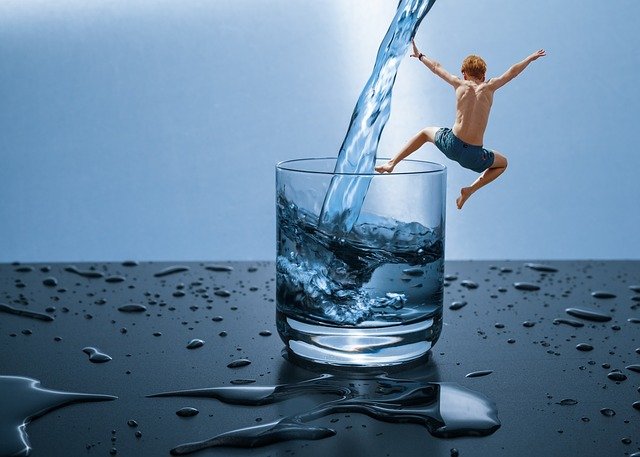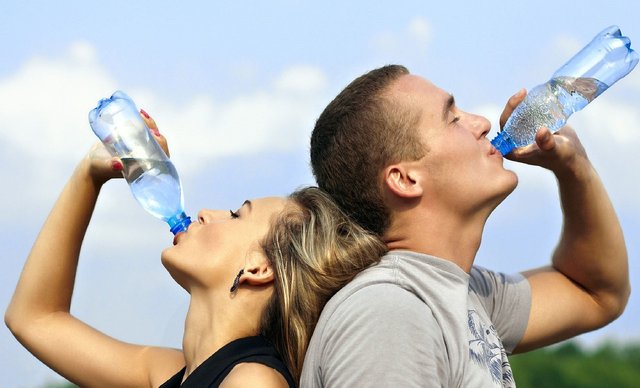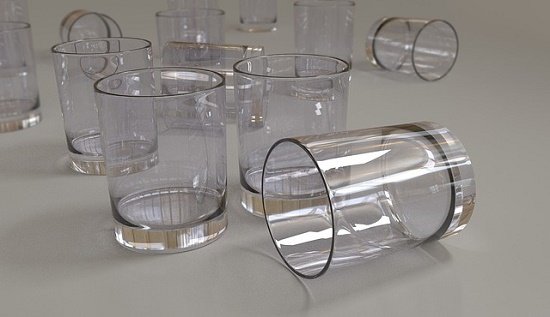Water Intoxication: Yes! People Can and Do Drink Themselves To Death
Introduction
Some of us often brag about how much water we could drink at a go, insinuating obviously how healthy we think that makes us. Well, you may just be taking in too much at that go, enough to poison you.
Water as you know is the sine qua non (indispensable and essential ingredient) of life. Almost everywhere in our body, water makes up about 60 percent of the adult human, running through the blood, inhabiting the cells, and lurking in the spaces between.
Water leaves the body naturally through the skin as sweat, the kidneys as urine, the intestines through defecation, exhaled breath, among other routes. And although replacing these lost stores is of high priority, rehydration can go more than required.
 Water Intoxication [License: Public Domain]: Pixabay
Water Intoxication [License: Public Domain]: Pixabay There’s no doubt about it, drinking enough water to stay hydrated is important for many reasons — such as preventing fatigue, regulating blood pressure, flushing out waste products and even controlling hunger. But can you have too much water? The answer is yes, you definitely can. All the cells and organs in your body need adequate amounts of water to function properly. However, excessive water consumption can lead to a rare phenomenon known as water intoxication.
What Is Water Intoxication and How True Is It?
 [License: Public Domain]: Pixabay
[License: Public Domain]: Pixabay Water intoxication is simply a condition of excess water in the body. This can occur when people drink much more water than their body needs. Also could be known as water poisoning, water intoxication can be said to be the disruption of brain function due to drinking too much water. Drinking a lot of water increases the amount of water in your blood. This water dilutes the electrolytes in your blood, especially sodium, making it fall below 135mmol/L (millimoles per litre), which is blood sodium’s minimum levels thereby causing fluids to move inside cells, which then swell.
When this swelling happens to brain cells (condition known as cerebral edema), it can produce dangerous and potentially life-threatening effects.
The condition of low levels of sodium in the blood is known as hyponatremia.
Over-hydration can lead to water intoxication. However, drinking large amounts of water usually does not cause over-hydration if the pituitary gland, kidneys, liver, and heart are functioning normally. To exceed the body’s ability to excrete water, a young adult with normal kidney function would have to drink more than 6 gallons (about 22 liters) of water a day on a regular basis. It is much more common among people whose kidneys do not excrete urine normally—for example, among people with a disorder of the heart, kidneys, or liver, or among premature infants, whose kidneys are immature.
In a nutshell, there are two factors that bring about water intoxication;
• Increased water intake: when you drink more water than your kidneys can remove in your urine.
• Retaining water: when your body can’t get rid of water properly due to medical conditions.
Severe cases of water intoxication whose symptoms include headache, fatigue, nausea, vomiting, frequent urination and mental disorientation; can lead to death.
Oh yeah, lest I forget. How true this is? As true as that an apple is a fruit. Lol. Oh shit that's not funny..
Let’s Talk About Hyponatremia
One of the serious consequences of too much water consumption is hyponatremia, also one of the most common electrolyte disorders. It is a decrease in blood sodium levels. It means having the sodium concentration in the blood fall below 135mmol/L, the normal concentration lying somewhere between 135 and 145 mmol/L.
Sodium is an electrolyte that helps balance fluids between the inside and outside of cells. Once there is a decrease in the sodium concentration as a result of water intake exceeding that of water excretion in the kidney, fluids shift from the outside to the inside of cells, causing them to swell. The causes of hyponatremia are typically classified by a person's body fluid status.
Now to explain further what exactly causes hyponatremia, permit me to dive a little deeper, technically.
ADH(Antidiuretic hormone) also called arginine vasopressin is a hormone made by the hypothalamus in the brain and stored in the posterior pituitary gland. It tells your kidneys how much water to conserve. ADH naturally and constantly regulates and balances the amount of water in your blood through the hypothalamic-renal feedback loop. Having explained this;
Hyponatremia occurs either
• When the hypothalamic-renal feedback loop is overwhelmed by increased fluid intake causing the feedback system to malfunction such that ADH is always "turned on". This automatically hinders the water regulation in the blood. Regardless, the pores in the kidney are always "open" despite of there being no signal from ADH to be open.
• When there is a renal disease/failure or the individual is having a syndrome of ‘inappropriate antidiuretic hormone secretion’-a condition in which high levels of a hormone (in this case, ADH) cause the body to retain water instead of excreting it normally in urine.
Its signs and symptoms may include: Nausea and vomiting, Headache, Confusion, Loss of energy, drowsiness and fatigue, Restlessness and irritability, Muscle weakness, cramps and Seizures.
Depending on the cause of hyponatremia, you may simply need to cut back on how much you drink. In other cases of hyponatremia, you may need electrolyte solutions and medications.
Then How Much Water Is Too Much?
A general recommendation as to how much one should drink is best aimed at about six to seven glasses or potentially more per day; Doing not more than 0.8-1.0 litres per hour on average.
 A few glasses won't kill you [License: Public Domain]: Pixabay
A few glasses won't kill you [License: Public Domain]: Pixabay This is not necessarily the best amount for everyone as each person is a bit different in terms of how much water they need, factored by body weight mostly.
Symptoms of hyponatremia can occur from as little as 3-4 litres of water in a short amount of time. Although your kidneys can eliminate about 20-28 litres of water a day, they can't get rid of more than 0.8-1.0 litres per hour .
However, as earlier said, the amount of water isn't the only factor. How long you take to drink the water also counts. You have a greater risk of developing water intoxication if you drink a lot of water in a short period of time. The risk is less if you drink the same amount over a much longer period of time.
Rather than counting glasses/litres of water, pay attention to how you feel, drinking only when thirsty.
Final Thoughts…
Hydration is really very important, but to prevent water intoxication and hyponatremia you should make sure to drink the right amount of water in proportion to how much sodium you’re losing, which obviously you do not know on a norm. So I would say listen to your body and drink mostly when you feel thirsty. How severe water intoxication becomes depends on how much and how quickly water was consumed.
References
https://www.healthline.com/health/overhydration
https://www.scientificamerican.com/article/strange-but-true-drinking-too-much-water-can-kill/
https://www.medicalnewstoday.com/articles/318619.php
https://draxe.com/water-intoxication/
https://www.webmd.com/fitness-exercise/features/water-intoxication#2
https://www.mayoclinic.org/diseases-conditions/hyponatremia/symptoms-causes/syc-20373711
https://www.lenntech.com/water-intoxication.htm
https://www.msdmanuals.com/home/hormonal-and-metabolic-disorders/water-balance/overhydration
https://en.wikipedia.org/wiki/Hyponatremia
https://en.wikipedia.org/wiki/Water_intoxication
https://en.wikipedia.org/wiki/Cerebral_edema
https://www.ncbi.nlm.nih.gov/pmc/articles/PMC4027093/
https://www.healthline.com/health/adh
All images are licensed under creative commons and eligible for commercial use.
Hi @raysmart. There were a lot of sentences which are similar to text within various websites on the net such as Quora and Scribd. This is an act of plagiarism and would not be tolerated within the steemSTEM community. In the future, you might want to consider making an original article.
Hello @chloroform, asides the fact that i used nothing from the aforementioned websites in the course of my research, the use of widely known definitions, proverbs, idioms or whatsoever text is in no way plagiarism. Kindly withdraw your statements. Thank you.
Well, I have just quoted two possible websites to which you might have used. There were others. The similarities were uncanny. Let me just quote one sentence from Quora:
Try to navigate through your article and you will find sentences which are 80-90% resemble the sentences I've just quoted. Unfortunately, I didn't believe in coincidence when it comes to plagiarism. You still can make it up though. Contact your designated mentor.
Like i said, the use of widely used terms or definitions cannot and would never be referred to as plagiarism. Plagiarism is the use of an author's original idea which those terms you quoted are nobody's original idea but well known facts. See this which i even quoted as one of my references >>>scientificamerican
Please re-read my article and gain the knowledge. Thanks!
Dude, what he meant is your sentence's structure. Your sentences and NOT ONLY your terms or definitions were similar to some sources found on the internet. I don't think you understand plagiarism or what kind of crimes you have committed.
Dude, I don't think you understand whatever. SIMILAR is not SAME.
I don't think I have mentioned plagiarism means it should be the SAME. SIMILAR can be passed off as plagiarism especially when it is intended.
OMG please i intended nothing. I put in work and i wrote my article myself with quoted researched websites. Y'all are just unbelievable. This is science not some storybook writing.
Just leave him be @conficker. It was pointless anyway.
Every liquid has a MAC ( maximum allowable concentration) . Above this Mac, it will be deadly.
Yes water also has a MAC.
Yes. Thank you.
I think I've heard about this case in a marathon race where a lady actually drank herself to death. It came as a shock, even to myself but I had not the time nor the zeal to learn more about that case. However, your article is an exposure for me. Thanks for bringing this on here.
Yea i think i read about that case. Most occurences are on sportsmen and its scary cause you think they require much more h20 but there is always a limit. Thank you @abumaryam.
Congratulations @raysmart! You received a personal award!
You can view your badges on your Steem Board and compare to others on the Steem Ranking
Vote for @Steemitboard as a witness to get one more award and increased upvotes!